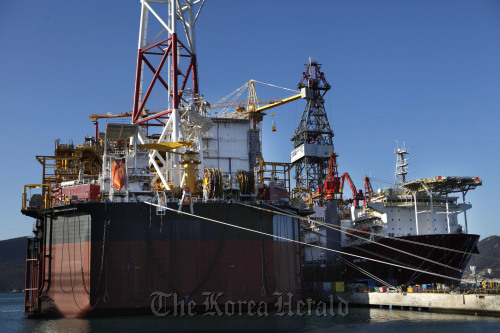Decline in new orders for bulk carriers, tankers to hurt medium-sized shipbuilders
The shipbuilding sector will be hit hard this year as financially squeezed European ship owners are expected to cut back or cancel orders amid the eurozone debt crisis.
Shipbuilding market research firm Clarksons said this year’s orders would shrink by 9.7 percent compared to last year due to concerns that the European financial woes will spread and other global uncertainties.
The impact will vary, however, between large shipbuilders that make offshore plants or high value-added ships, and medium-sized companies that manufacture mostly merchant vessels.
New orders for bulk carriers and tankers, given out by financially troubled shipping companies, are likely to continue downhill, whereas orders for liquefied natural gas carriers or deep-sea oil drilling ships won’t fall unless international oil prices plummet.
 |
The Pazflor floating production, storage and offloading facility (left) and a drill ship ordered by a Brazilian company are moored at the Daewoo Shipbuilding & Marine Engineering Co. shipyard in Geoje, South Gyeongsang Province. (Bloomberg) |
The Ministry of Knowledge Economy said there will be constant orders for offshore plants and LNG ships citing major gas development projects under way in Australia and Russia and crude oil exploration in Nigeria.
Since Korea’s large shipbuilders have strength in producing offshore plants, they will be less affected by the global economic slowdown.
Park Moo-hyun, an analyst at E-Trade Securities, said the impact of the declining demand for merchant ships on Korea’s three largest shipbuilders will be limited, but that it was dampening the overall investor sentiment.
“The bulk carrier market is affected by China’s exports, advanced economies’ consumption and the growth of the Chinese manufacturing sector which causes iron ore demands to rise,” he said.
“The possibility of a global economic contraction and insolvency of European banks, which account for about 80 percent of ship financing worldwide, due to the eurozone fiscal crisis has turned the investor sentiment negative for shipbuilders.”
Chinese shipbuilders, which have closely chased Korean companies since 2008, are expected to undergo restructuring as they rely heavily on tankers and bulk carriers.
The ministry forecast that Korean shipbuilders will be able to maintain the top spot in the volume of new orders this year as offshore plants and LNG carriers will take up a larger portion of the global demand.
Korean companies won 48.2 percent of the world’s new shipbuilding orders last year, or 13.55 million compensated gross tons, beating their Chinese rivals (at 9.2 million CGT).
Eleven of the country’s shipbuilders expect $54 billion in new orders this year, according to the ministry and the Korea Shipbuilders’ Association.
The 11 companies are Hyundai Heavy Industries, Daewoo Shipbuilding and Marine Engineering, Samsung Heavy Industries, Hyundai Samho Heavy Industries, Hyundai Mipo Dockyard, Hanjin Heavy Industries and Construction, STX Offshore and Shipbuilding, ShinaSb Yard, Dae Sun Shipbuilding and Engineering, Sungdong Shipbuilding and Marine Engineering, and SPP Shipbuilding.
By Kim So-hyun (
sophie@heraldcorp.com)








